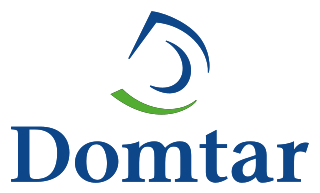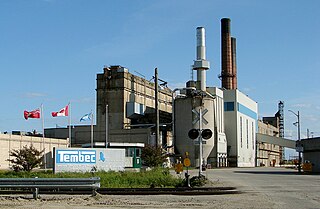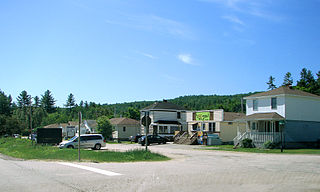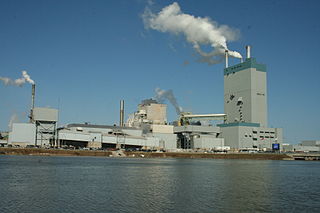Valmet Oyj, a Finnish company, is a developer and supplier of technologies, automation systems and services for the pulp, paper and energy industries.

Kimberly-Clark Corporation is an American multinational personal care corporation that produces mostly paper-based consumer products. The company manufactures sanitary paper products and surgical & medical instruments. Kimberly-Clark brand name products include Kleenex facial tissue, Kotex feminine hygiene products, Cottonelle, Scott and Andrex toilet paper, Wypall utility wipes, KimWipes scientific cleaning wipes and Huggies disposable diapers and baby wipes.

The pulp and paper industry comprises companies that use wood as raw material and produce pulp, paper, paperboard, and other cellulose-based products.

The International Paper Company is an American pulp and paper company, the largest such company in the world. It has approximately 56,000 employees, and is headquartered in Memphis, Tennessee.
The Weyerhaeuser Company is an American timberland company which owns nearly 12,400,000 acres of timberlands in the U.S., and manages an additional 14,000,000 acres of timberlands under long-term licenses in Canada. The company has manufactured wood products for over a century. It operates as a real estate investment trust (REIT).

Domtar Corporation is a North American pulp and paper company that manufactures and markets wood fiber-based pulp and paper products. The company operates pulp mills and paper mills in Windsor, Quebec; Dryden, Ontario; Kamloops, British Columbia; Ashdown, Arkansas; Hawesville, Kentucky; Plymouth, North Carolina; Marlboro County, South Carolina; and Kingsport, Tennessee. While Domtar operated independently for several decades and was listed on the Toronto and New York stock exchanges, the company was acquired by Paper Excellence Group in November 2021 and has since operated as a subsidiary.

Tembec Industries Inc., known as Tembec, was a paper company in Canada, founded by Frank Dottori. In 2011, Tembec had approximately 3000 employees, with locations in Canada, United States, and France. Tembec's operating divisions included Forest Products, Pulp, Paper & Paperboard, and Chemicals.

John Roaf Barber was a Canadian businessman and politician, who represented Halton in the Legislative Assembly of Ontario from 1898 to 1904.

Témiscaming is a city located at the south end of Lac Témiscamingue on the upper Ottawa River in the Témiscamingue Regional County Municipality of western Quebec, Canada. Also nearby is Lake Kipawa.

Catalyst Paper Corporation is a pulp and paper company based in Richmond, British Columbia. It operates five pulp mills and paper mills, producing a combined 1.8 million tonnes of paper and 491,000 tonnes of market pulp annually. The mills mostly produce magazine paper and newsprint.
Norske Skog Saugbrugs AS is a pulp mill and paper mill located in Halden, Norway, which produces supercalender (SC) magazine paper. Located in the river Tista in Tistedalen, the mill produces 550,000 tonnes per year in three paper machines. Pulp is produced both from virgin fibers at an on-site thermomechanical pulp (TMP) mill. Part of Norske Skog, it is the sole remaining magazine mill in Norway.

Resolute Forest Products, formerly known as AbitibiBowater Inc., is a Canada-based pulp and paper company. Headquartered in Montreal, Quebec, the company was formed in 2007 by the merger of Bowater and Abitibi-Consolidated. At that time, the merged company was the third largest pulp and paper company in North America, and the eighth largest in the world.

Thorne is an unincorporated community within the unincorporated township of Poitras, in the Canadian province of Ontario. It is located in the census division of Nipissing District. A designated place served by a local services board, the community had a population of 204 in the 2016 Canadian Census.

The Great Lakes Paper Company was the operator of the largest and most modern pulp and paper manufacturing facility in the world. The Company employed over 4,000 in Northern Ontario, starting in 1924 as a pulp mill at Fort William, Ontario. Great Lakes had a highly developed social network within the company, including a children's Christmas party held at a local arena, and an annual picnic held at a local park, as well as many sports teams and other social groups. The company's working environment was enhanced by cultural diversity. For example under the Government of Canada's immigration policy, the "Close Relatives Scheme" resulted in over 400 Ukrainian refugees being employed as workers after World War II.
Kruger Inc. is a Canadian private company which manufactures publication papers, tissue, lumber and other wood products, corrugated cartons from recycled fibres, green and renewable energy, and wines and spirits. Kruger Inc. operates facilities in Québec, Ontario, British Columbia, Newfoundland and Labrador, and the United States.

The environmental effects of paper are significant, which has led to changes in industry and behaviour at both business and personal levels. With the use of modern technology such as the printing press and the highly mechanized harvesting of wood, disposable paper became a relatively cheap commodity, which led to a high level of consumption and waste. The rise in global environmental issues such as air and water pollution, climate change, overflowing landfills and clearcutting have all lead to increased government regulations. There is now a trend towards sustainability in the pulp and paper industry as it moves to reduce clear cutting, water use, greenhouse gas emissions, fossil fuel consumption and clean up its influence on local water supplies and air pollution.

The Dryden pulp mill, also known as the Reed Mill, is a paper and pulp mill in Dryden, Ontario. During the 1960s and 70s, mercury poisoning from the mill caused one of Canada's worst environmental disasters: Dryden Chemicals Ltd dumped mercury into the English-Wabigoon River, upstream of Grassy Narrows First Nation, poisoning the fish which were their staple food. Members of the Grassy Narrows and the Whitedog communities downstream from the mill suffered severe mercury poisoning.
The Bowater Mersey Paper Company Limited, commonly shortened to Bowater Mersey, is a forestry company operating in the Canadian province of Nova Scotia.

Crofton Mill is a pulp mill and paper mill located in the Vancouver Island town of Crofton, British Columbia. The mill has 3 paper machines and 2 pulp machines, which produce 349,000 tonnes of newsprint and directory paper, and 355,000 tonnes of northern bleached softwood kraft.














